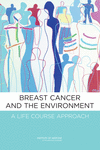Can you reduce your environmental risk of breast cancer?
San Antonio – at the San Antonio Breast Cancer Symposium (SABCS), the Institute of Medicine (IOM) report on “Breast Cancer and the Environment” was eagerly anticipated.
 Published today, the report appears to me to offer little in the way of new insight into how women should live in order to lower their environmental risk of breast cancer.
Published today, the report appears to me to offer little in the way of new insight into how women should live in order to lower their environmental risk of breast cancer.
The review of the scientific literature undertaken by the IOM notes that epidemiologic studies have shown an association between some environmental risk factors and breast cancer. These include ionizing radiation & combination hormone therapy.
The report goes on to say that for many other environmental factors, the evidence is “limited, contradictory or absent”.
The conclusion from the report is that “women may have some opportunities to reduce their risk of breast cancer through personal actions:”
- Avoiding unnecessary medical radiation throughout life
- Avoiding some forms of postmenopausal hormone therapy
- Avoiding Smoking
- Limiting Alcohol Consumption
- Increasing physical activity
- Minimizing weight gain (for those at risk of postmenopausal breast cancer)
Much of the above advice would apply to anyone looking to maintain a healthy lifestyle, but it’s hard to quantify the potential benefit. The report notes the “potential risk reductions for any individual woman will vary and be modest.”
Given that non-smokers can end up with lung cancer, it’s hard to predict who will get cancer and to what extent exposure to environmental factors may have an impact.
Are some people more disposed to environmental risk factors than others?
As we move towards personalized medicine and a greater understanding of the individual genome, it will be interesting to see if we will gain more insight into who is most at risk from the environment.
Perhaps in the future we will be better able to identify those individuals whose genetic make-up result in them being more at risk from others of certain environmental stresses.
In the meantime, if you have an interest in the IOM Breast Cancer and the Environment report it is freely available to download.